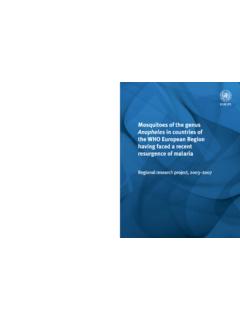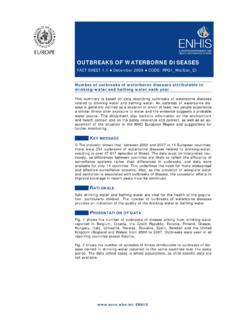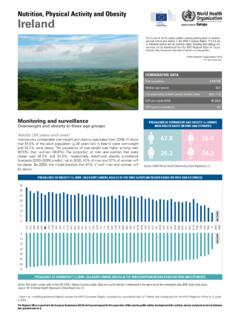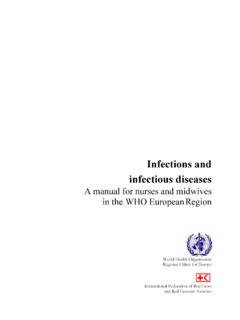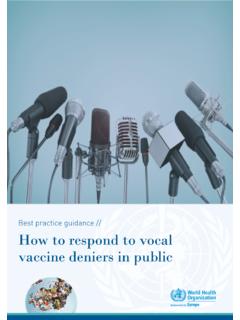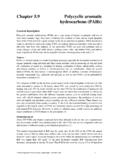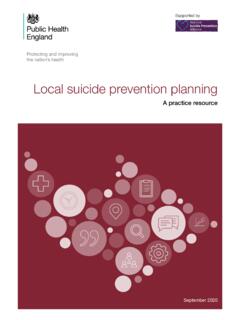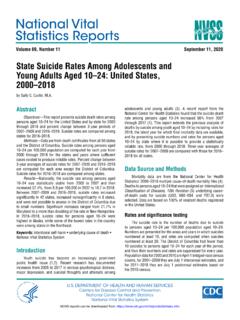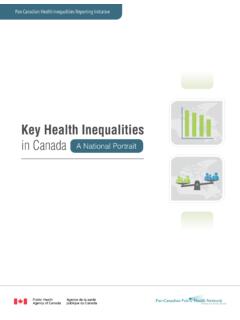Transcription of Impact of economic crises on mental health
1 The WHO Regional Office for Europe Abstract The World health Organization (WHO) is a The economic crisis is expected specialized agency of the United Nations created in 1948 with the primary responsibility to produce secondary mental for international health matters and public health effects that may increase health . The WHO Regional Office for Europe is one of six regional offices throughout the suicide and alcohol death rates. world, each with its own programme geared However, the mental health to the particular health conditions of the countries it serves. effects of the economic crisis can be offset by social welfare Member States and other policy measures. For Albania Lithuania example, active labour market Andorra Luxembourg Armenia Malta programmes aimed at helping Austria Monaco people retain or regain jobs Azerbaijan Montenegro Belarus Netherlands counteract the mental health Belgium Norway effects of the economic crisis.
2 Bosnia and Poland Herzegovina Portugal Family support programmes Bulgaria Republic of Moldova contribute to counteracting Croatia Romania Cyprus Russian Federation the mental health effects of Czech Republic San Marino the crisis. Increasing alcohol Denmark Serbia Estonia Slovakia prices and restricting alcohol Finland Slovenia availability reduce the harmful France Spain Georgia Sweden effects on mental health Germany Switzerland and save lives. Debt relief Greece Tajikistan Hungary The former Yugoslav programmes will help to reduce Iceland Republic of the mental health effects of the Ireland Macedonia Israel Turkey economic crisis and accessible Italy Turkmenistan and responsive primary care Kazakhstan Ukraine Kyrgyzstan United Kingdom services support people at risk Latvia Uzbekistan and prevent mental health effects. World health Organization Regional Office for Europe Impact of economic Scherfigsvej 8.
3 DK-2100 Copenhagen . Denmark Tel.: +45 39 17 17 17. crises on mental health Fax: +45 39 17 18 18. E-mail: Web site: mnh&eco__COVER-- 1 2/24/2011 10:56:25 AM. Impact of economic crises on mental health ABSTRACT. The economic crisis is expected to produce secondary mental health effects that may increase suicide and alcohol death rates. However, the mental health effects of the economic crisis can be offset by social welfare and other policy measures. For example, active labour market programmes aimed at helping people retain or regain jobs counteract the mental health effects of the economic crisis. Family support programmes contribute to counteracting the mental health effects of the crisis. Increasing alcohol prices and restricting alcohol availability reduce the harmful effects on mental health and save lives. Debt relief programmes will help to reduce the mental health effects of the economic crisis and accessible and responsive primary care services support people at risk and prevent mental health effects.
4 Keywords mental health . economic RECESSION. ALCOHOLISM prevention and control suicide prevention and control health POLICY. PRIMARY health CARE. EUROPE. Cover photo: Zolt n Balogh/VIPC 2007. Address requests about publications of the WHO Regional Office for Europe to: Publications WHO Regional Office for Europe Scherfigsvej 8. DK-2100 Copenhagen , Denmark Alternatively, complete an online request form for documentation, health information, or for permission to quote or translate, on the Regional Office web site ( ). World health Organization 2011. All rights reserved. The Regional Office for Europe of the World health Organization welcomes requests for permission to reproduce or translate its publications, in part or in full. The designations employed and the presentation of the material in this publication do not imply the expression of any opinion whatsoever on the part of the World health Organization concerning the legal status of any country, territory, city or area or of its authorities, or concerning the delimitation of its frontiers or boundaries.
5 Dotted lines on maps represent approximate border lines for which there may not yet be full agreement. The mention of specific companies or of certain manufacturers' products does not imply that they are endorsed or recommended by the World health Organization in preference to others of a similar nature that are not mentioned. Errors and omissions excepted, the names of proprietary products are distinguished by initial capital letters. All reasonable precautions have been taken by the World health Organization to verify the information contained in this publication. However, the published material is being distributed without warranty of any kind, either express or implied. The responsibility for the interpretation and use of the material lies with the reader. In no event shall the World health Organization be liable for damages arising from its use.
6 The views expressed by authors, editors, or expert groups do not necessarily represent the decisions or the stated policy of the World health Organization. CONTENTS. Page 1. 2. Supplementary material .. 2. 1. mental health creates mental capital .. 1. 2. How can we contribute to mental health ? .. 3. 3. Who will the crisis hit?.. 6. 4. How to mitigate the effects of the 8. Active labour market programmes .. 11. Family support programmes .. 11. Control of alcohol prices and availability .. 12. Primary care for the people at high risk of mental health problems .. 12. Debt relief programmes .. 12. 5. How to maintain mental health systems in the economic crisis .. 13. Tackle the stigma of mental illness .. 13. Build the case for investing in mental health .. 14. Continue mental health reforms .. 14. Ensure universalism in mental health services.
7 14. 6. Conclusions .. 15. References .. 16. Impact of economic crises on mental health page 1. Foreword It is well known that mental health problems are related to deprivation, poverty, inequality and other social and economic determinants of health . economic crises are therefore times of high risk to the mental well-being of the population and of the people affected and their families. The economic crisis that started in 2007 has continued to pose major challenges in the WHO European Region. It has led to significant declines in economic activity, a rise in unemployment, depressed housing markets and an increasing number of people living in poverty. The rise in national debt is forcing governments to implement severe cuts in public spending. Significant risks remain in the world economy, and many countries are facing an era of austerity in health and welfare services.
8 The focus on social and economic determinants of the forthcoming new European health policy, health 2020, will acknowledge these new life circumstances. It will stress that health objectives are influenced by a range of social objectives that require action across many sectors. This notion is especially important in times of economic crisis, because policy actions in sectors other than health can amend some of the health effects of the crisis. Targeted investment in public services that are crucial for many people's well-being can ameliorate the social and economic determinants of health and the associated health disparities. The integrated response across policies must include accessible health services, with a focus on primary care response. This booklet aims to present current knowledge on how economic downturns affect population mental health and outlines some of the benefits of action that could be implemented to reduce the harmful effects on mental health of the current economic crisis.
9 Of particular value is addressing both the benefits of welfare policies and the value of health action. Neither should be considered in isolation, since a lesson from this crisis is the interconnectedness of economic activity and mental health . Zsuzsanna Jakab WHO Regional Director for Europe Impact of economic crises on mental health page 2. Acknowledgements The following people contributed to this publication: Kristian Wahlbeck, WHO Regional Office for Europe;. Peter Anderson, Faculty of health , Medicine and Life Sciences, Maastricht University, Netherlands;. Sanjay Basu, Department of Medicine, University of California at San Francisco, USA;. David McDaid, WHO European Observatory on health Systems and Policies, Brussels, Belgium and LSE health and Social Care, London School of Economics and Political Science, United Kingdom; and David Stuckler, Department of Global health and Population, Harvard University, USA.
10 The following people served as external advisers for this publication: Pol Gerits, Federal Public Service health , Food Chain Safety and Environment, Brussels, Belgium;. Hristo Hinkov, National Centre for Public health Protection, Sofia, Bulgaria; and Regula Ricka-Heidelberger, Federal Department of Home Affairs, Berne, Switzerland. Supplementary material This guide is accompanied by two reviews of evidence, available on : Stuckler D, Basu S, McDaid D. Depression amidst depression. mental health effects of the ongoing recession. A background paper prepared for the WHO Regional Office for Europe Anderson P. economic crisis and mental health and well-being. A background paper prepared for the WHO Regional Office for Europe. Impact of economic crises on mental health page 1. 1. mental health creates mental capital There is no health without mental health (1).




